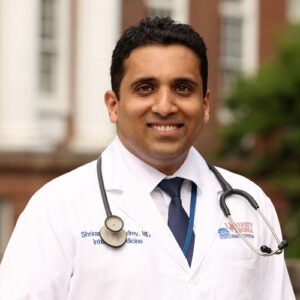
Shrirang Gadrey, MBBS, MPH
Shrirang Gadrey, MBBS, MPH, an associate professor in the Department of Medicine, Division of Hospital Medicine was awarded a $4 million NIH grant for a project titled “Novel physiomarkers of high-risk labored breathing for advance warning of clinical deterioration.”
Labored breathing patterns (i.e., abnormal respiratory kinematics) are physical examination signs of respiratory instability. Contemporary patient monitoring systems do not measure respiratory kinematics beyond the average respiratory rate. Clinicians are forced to rely on qualitative visual inspections to monitor for labored breathing. Such assessments lack sensitivity and inter-rater reliability, and they are labor intensive. Therefore, respiratory kinematic information cannot be used in early warning systems. The resulting delays and errors in the recognition of labored breathing can prove life threatening.
The barriers to large-scale respiratory kinematic measurement were recently overcome when a UVA team led by Dr. Gadrey developed a simple and scalable new technology called ARK (Analysis of Respiratory Kinematics). ARK uses wearable motion sensors that are easy to apply in any setting. Yet, powered by original breakthroughs in inertial signal processing, it quantifies respiratory kinematics with high fidelity. In this project, the ARK team will pioneer the quantitative documentation of the human respiratory kinematic profile on an unprecedented scale. The kinematic properties of the mature respiratory system will be recorded in a large cohort of adults during emergency room visits for respiratory illness. Additionally, the properties of an immature respiratory system will be explored by establishing the safety, feasibility, and validity of ARK monitoring in a cohort of premature neonates in the neonatal intensive care unit.
The expected outcome is a comprehensive understanding of diagnostic and prognostic significance of well-known breathing motion patterns, and the discovery of novel breathing phenotypes. By enhancing the completeness of bedside physiological measurement, this work holds the promise for a far-reaching impact, including major leaps in predictive analytics that trigger timely treatment, reduce ventilator use, unburden ICUs, and save lives.
Collaborators on the project include William Ashe, PhD; Thomas Hartka, MD, MS, MSDS; Brynne Sullivan, MD; Sarah Ratcliffe, PhD; and J. Randall Moorman, MD, from the UVA School of Medicine.
Filed Under: Research
